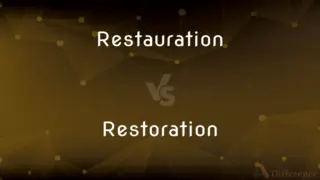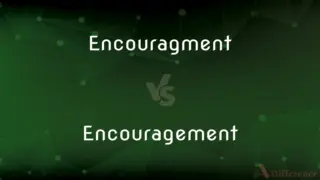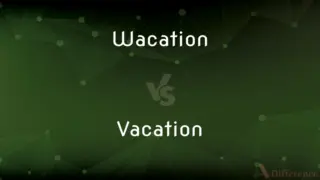Premiss vs. Premise — Which is Correct Spelling?
Edited by Tayyaba Rehman — By Sumaia Saeed — Updated on April 18, 2024
Premiss is the incorrect spelling of premise, which refers to a statement or idea that is assumed to be true and forms the basis for a conclusion.
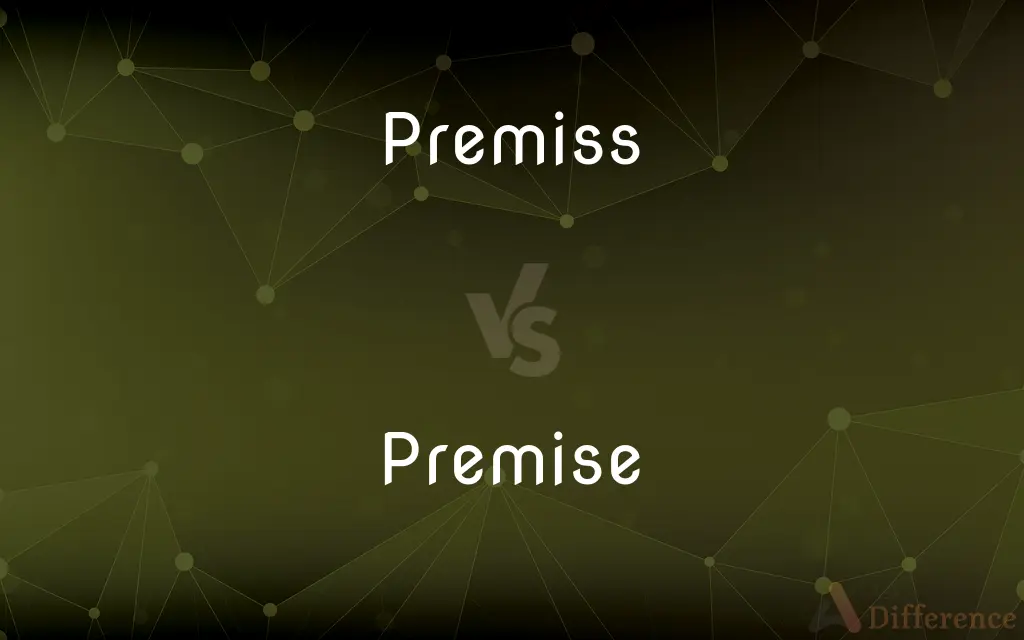
Table of Contents
Which is correct: Premiss or Premise
How to spell Premise?

Premiss
Incorrect Spelling

Premise
Correct Spelling
ADVERTISEMENT
Key Differences
"Premise" is the correct spelling in both singular and plural forms (the plural can also be "premises"), following standard English conventions.
Use mnemonic: "I need a premise to conclude," linking the "ise" in premise with the concept of needing a basis to form a conclusion.
Remember that "premise" has the same ending as "compromise" and "demise," helping to reinforce the correct spelling.
How Do You Spell Premise Correctly?
Incorrect: The argument was based on a faulty premiss.
Correct: The argument was based on a faulty premise.
Incorrect: He developed his theory on a simple premiss.
Correct: He developed his theory on a simple premise.
ADVERTISEMENT
Incorrect: The premiss of her argument is not supported by facts.
Correct: The premise of her argument is not supported by facts.
Incorrect: Her essay relies on a well-established premiss.
Correct: Her essay relies on a well-established premise.
Incorrect: Each premiss was carefully examined during the debate.
Correct: Each premise was carefully examined during the debate.
Premise Definitions
A previous statement or proposition from which another is inferred.
The conclusion was drawn on the solid premise that energy costs are rising.
In real estate, premises refer to a house or building, along with its grounds.
The company owns the premises where the factory operates.
In logic, a premise is each of the first two propositions of a syllogism.
His major premise was that all humans are mortal.
A premise or premiss is a statement that an argument claims will induce or justify a conclusion. It is an assumption that something is true.
A proposition upon which an argument is based or from which a conclusion is drawn.
One of the propositions in a deductive argument.
Either the major or the minor proposition of a syllogism, from which the conclusion is drawn.
Land, the buildings on it, or both the land and the buildings on it.
A building or particular portion of a building.
(Law) The part of a deed that states the details of the conveyance of the property.
To provide a basis for; base
"The American Revolution had been premised on a tacit bargain that regional conflicts would be subordinated to the need for unity among the states" (Ron Chernow).
To state or assume as a proposition in an argument.
To state in advance as an introduction or explanation.
A proposition antecedently supposed or proved; something previously stated or assumed as the basis of further argument; a condition; a supposition.
(logic) Any of the first propositions of a syllogism, from which the conclusion is deduced.
Matters previously stated or set forth; especially, that part in the beginning of a deed, the office of which is to express the grantor and grantee, and the land or thing granted or conveyed, and all that precedes the habendum; the thing demised or granted.
A piece of real estate; a building and its adjuncts.
Trespass on another’s premises
(authorship) The fundamental concept that drives the plot of a film or other story.
To state or assume something as a proposition to an argument.
To make a premise.
To set forth beforehand, or as introductory to the main subject; to offer previously, as something to explain or aid in understanding what follows.
To send before the time, or beforehand; hence, to cause to be before something else; to employ previously.
Either of the first two propositions of a syllogism, from which the conclusion is drawn.
While the premises stand firm, it is impossible to shake the conclusion.
Matters previously stated or set forth; esp., that part in the beginning of a deed, the office of which is to express the grantor and grantee, and the land or thing granted or conveyed, and all that precedes the habendum; the thing demised or granted.
A piece of real estate; a building and its adjuncts; as, to lease premises; to trespass on another's premises.
To set forth beforehand, or as introductory to the main subject; to offer previously, as something to explain or aid in understanding what follows; especially, to lay down premises or first propositions, on which rest the subsequent reasonings.
I premise these particulars that the reader may know that I enter upon it as a very ungrateful task.
To make a premise; to set forth something as a premise.
A statement that is assumed to be true and from which a conclusion can be drawn;
On the assumption that he has been injured we can infer that he will not to play
Set forth beforehand, often as an explanation;
He premised these remarks so that his readers might understand
Furnish with a preface or introduction;
She always precedes her lectures with a joke
He prefaced his lecture with a critical remark about the institution
Take something as preexisting and given
The basis or groundwork of a theory or argument.
The research paper was built on the premise that climate change affects weather patterns.
Premise Meaning in a Sentence
The documentary operates on the premise that the art world is corrupt.
They agreed with the premise that the project would benefit the community.
Her entire theory rests on a controversial premise.
The scientist explained the premise behind her experiment.
The premise of his speech was that technology can enhance education.
He based his business plan on the premise that demand would continue to grow.
She questioned the validity of the premise upon which the policy was based.
The novel’s premise captured the interest of many readers.
The main premise of her book is that society undervalues teachers.
He challenged the basic premise of my argument during the discussion.
The premise of mutual respect is essential for any successful negotiation.
Without a solid premise, the argument falls apart.
Each chapter explores a different premise related to behavioral economics.
The comedy is based on the simple premise that opposites attract.
The premise of equal opportunity was central to the debate.
The premise that global warming can be reversed is still debated.
Their agreement was based on the premise that all data shared would remain confidential.
Critics argue that the film’s premise is unrealistic.
The premise that the Internet is a free space is increasingly being questioned.
She built her argument on the premise that historical trends predict future occurrences.
The marketing campaign was founded on the premise of inclusivity.
The premise that humans need to explore space to survive was proposed by the speaker.
He wrote a paper challenging the traditional premise of market economics.
The legal case was grounded on the premise that the contract was violated.
Premise Idioms & Phrases
Under the premise
With the understanding or assumption.
She joined the committee under the premise that it would not interfere with her current responsibilities.
Beyond the premise
Outside the scope of the initial assumption.
The discussion went beyond the premise of the original debate.
Challenge the premise
To question the foundation or basis of an argument.
It's important to challenge the premise before accepting the conclusions.
Shift the premise
To change the underlying assumption of an argument.
The debate shifted the premise to focus on environmental concerns.
On the premise
Based on the belief or assumption.
He operated on the premise that he had the full support of his team.
False premise
An incorrect proposition that leads to a faulty conclusion.
Their argument collapsed because it was based on a false premise.
Accept on premise
To agree with the foundational belief.
He accepted the job offer on the premise that he would be promoted within a year.
Build on the premise
To develop further arguments or theories based on an initial assumption.
The philosopher built on the premise introduced by his predecessor.
Rest on the premise
To depend entirely on a particular assumption.
Her case rested on the premise that the evidence was admissible.
Reject the premise
To refuse to accept the basis of an argument.
They rejected the premise that the project was inherently risky.
Revise the premise
To alter the initial assumption based on new information or insights.
He revised the premise of his argument after receiving feedback.
Defend the premise
To support and uphold the basis of an argument.
The lawyer defended the premise that his client acted in self-defense.
Based on the premise
Grounded on a particular belief or theory.
The policy was based on the premise that economic growth benefits everyone.
Undermine the premise
To weaken the foundation of an argument.
Recent studies undermine the premise that this treatment is effective.
Explore the premise
To examine or investigate the basis of an argument.
The study explored the premise that stress affects health.
Question the premise
To doubt or dispute the basis of an argument.
It's crucial to question the premise before drawing conclusions.
Strengthen the premise
To make the foundational argument more convincing.
He added more data to strengthen the premise of his thesis.
Expand on the premise
To elaborate or add details to the initial assumption.
The author expanded on the premise in the second edition of her book.
Return to the premise
To go back to the initial assumption after a digression.
Let's return to the premise to refocus our discussion.
Test the premise
To check the validity or soundness of the foundational assumption.
Experimentation is necessary to test the premise of the hypothesis.
Common Curiosities
How is premise used in a sentence?
Premise is used as a noun to refer to a proposition that forms the basis for an argument or conclusion.
Why is it called premise?
It is called a premise because it derives from the Latin "praemissus," meaning "put before," used to denote statements put before others in argumentation.
What is a stressed syllable in premise?
The stressed syllable in premise is 'pre.'
What is the pronunciation of premise?
Premise is pronounced as \ˈpre-məs.
What is the root word of premise?
The root word of premise is the Latin "praemissus."
How do we divide premise into syllables?
Premise is divided as pre-mise.
What part of speech is premise?
Premise is a noun.
How many syllables are in premise?
There are two syllables in premise.
What is another term for premise?
Another term for premise is "proposition."
What is the opposite of premise?
The opposite of a premise might be a conclusion or result.
Is premise an adverb?
No, premise is not an adverb.
Is premise an abstract noun?
Yes, premise is an abstract noun, as it refers to an idea or concept that is not tangible.
Which determiner is used with premise?
Determiners such as "the," "a," or "an" can be used with premise, depending on the context.
Which vowel is used before premise?
The use of vowels before premise is not specifically patterned; it depends on the words that precede it in a sentence.
What is the verb form of premise?
The related verb form is "premise," used less commonly to mean to base an argument upon.
Is premise a vowel or consonant?
The word premise starts with a consonant.
Is the word premise imperative?
No, premise is a noun and does not have an imperative form.
Is the word “premise” a Direct object or an Indirect object?
Premise can be used as a direct object (e.g., I understand the premise) or indirectly in sentences.
What is the plural form of premise?
The plural form of premise is "premises."
Is the word premise Gerund?
No, premise is not a gerund; it is a noun.
What is the singular form of premise?
The singular form of premise is "premise."
Is premise a countable noun?
Yes, premise is a countable noun.
Is the premise term a metaphor?
Premise itself is not a metaphor; it is a straightforward noun referring to an initial statement or proposition.
Which preposition is used with premise?
Common prepositions used with premise include "on," "under," and "with," depending on the context, e.g., "based on the premise," "under the premise."
Which article is used with premise?
The definite article "the" or the indefinite articles "a" or "an" can be used with premise, depending on the context.
Is premise a noun or adjective?
Premise is a noun.
Is premise a negative or positive word?
Premise is a neutral word; it is not inherently negative or positive.
Is premise a collective noun?
No, premise is not a collective noun.
Which conjunction is used with premise?
Conjunctions are not specifically related to premise unless part of a larger sentence structure.
Share Your Discovery
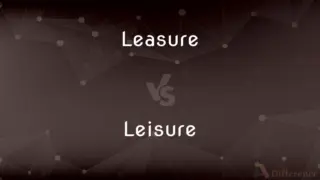
Previous Comparison
Leasure vs. Leisure
Next Comparison
Trowal vs. TroughAuthor Spotlight
Written by
Sumaia SaeedEdited by
Tayyaba RehmanTayyaba Rehman is a distinguished writer, currently serving as a primary contributor to askdifference.com. As a researcher in semantics and etymology, Tayyaba's passion for the complexity of languages and their distinctions has found a perfect home on the platform. Tayyaba delves into the intricacies of language, distinguishing between commonly confused words and phrases, thereby providing clarity for readers worldwide.












